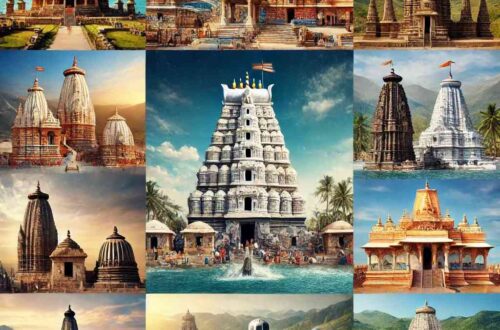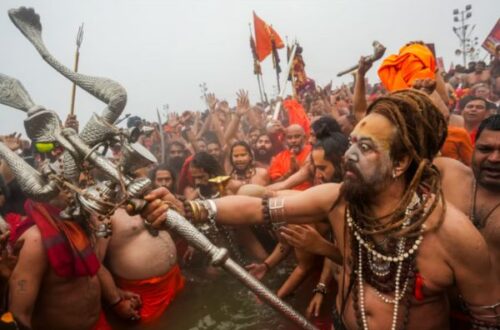The 13 Akharas of the Mahakumbh Mela: Ancient Traditions and Their Modern Relevance
The Mahakumbh Mela, the world’s largest religious gathering, is incomplete without the participation of the 13 Akharas. These spiritual institutions, rooted in ancient traditions, play a crucial role in preserving Hinduism’s rich heritage. In this article, we explore the origins, philosophies, and contemporary relevance of these Akharas while shedding light on their significance at the Mahakumbh Mela.
Understanding the Akharas: What Are They?
The word ‘Akhara’ refers to a place where ascetics and saints undergo rigorous training in spirituality, meditation, and sometimes even martial arts. These institutions were historically formed to safeguard Hinduism and its teachings from external influences. Over the centuries, Akharas have evolved, balancing tradition with contemporary religious and social responsibilities.
At the Mahakumbh Mela, the Akharas hold a place of supreme importance, leading the grand Shahi Snan (Royal Bath) procession. Devotees eagerly watch as these revered saints take their dip in the sacred waters, believing it purifies the soul and leads to salvation.
The 13 Akharas of Mahakumbh Mela
Each Akhara follows unique beliefs and practices, yet they are all deeply connected to Hindu philosophy. Below is a detailed table highlighting their origins, philosophies, and roles in the Mahakumbh Mela.
| Akhara Name | Philosophy & Practices | Role at Mahakumbh |
|---|---|---|
| 1. Nirmohi Akhara | Devoted to Lord Ram, known for ascetic practices and discipline. | Leads a large procession during the Shahi Snan, focusing on meditation and spiritual purification. |
| 2. Akhil Bharatiya Akhara Parishad | A federation of all 13 Akharas, promoting spiritual unity. | Coordinates Akharas’ participation and ensures smooth organization. |
| 3. Juna Akhara | Follows the Shaiva tradition with intense physical and spiritual training. | Leads the largest procession during the Shahi Snan. |
| 4. Buddh Akhara | Promotes Buddhism’s teachings of peace, non-violence, and meditation. | Connects Buddhist teachings with Hindu rituals and focuses on meditation. |
| 5. Mahant Akhara | Emphasizes social welfare, education, and meditation. | Organizes welfare activities alongside spiritual gatherings. |
| 6. Shankaracharya Akhara | Dedicated to Advaita Vedanta, focused on meditation, knowledge, and philosophical debates. | Organizes spiritual discussions and meditation sessions. |
| 7. Digambar Akhara | Follows the Digambara sect of Jainism, practicing strict asceticism. | Participates in the Mela with minimal rituals, focusing on meditative practices. |
| 8. Naga Akhara | Known for martial practices and fierce devotion to asceticism and strength. | Leads the Naga procession during the Shahi Snan. |
| 9. Udasin Akhara | Formed by Guru Nanak, emphasizes peace, tolerance, and universal love. | Plays a role in interfaith dialogue and unity. |
| 10. Sri Panchayati Akhara | Devoted to Lord Vishnu and incorporates extensive ritual worship. | Leads Vishnu-centric spiritual processions and rituals. |
| 11. Kalinjar Akhara | Practices a mix of Tantra and devotion to Lord Shiva. | Performs elaborate Tantric rituals and meditative practices. |
| 12. Arya Akhara | Founded by Swami Dayanand Saraswati, focuses on Vedic teachings and social reforms. | Conducts discussions on Vedic philosophy during the Mela. |
| 13. Sri Ganga Akhara | Dedicated to worshiping the river Ganges and its significance in Hindu spirituality. | Performs sacred rituals by the banks of the Ganges. |
| **Niranjani Akhara | Rooted in Shaivism, focusing on devotion to Lord Shiva and ascetic practices. | Plays a key role in Shahi Snan processions. |
Modern Relevance of Akharas in Today’s Society
Though the Akharas were primarily formed for spiritual and defense purposes in ancient times, they continue to hold significant importance today. Here’s how they are relevant in modern society:
1. Spiritual Guidance & Meditation
In an era where stress and anxiety are common, Akharas provide a sanctuary for seekers looking for inner peace through meditation and yoga. Many Akharas now welcome followers from all walks of life.
2. Social Welfare & Charity
Several Akharas run educational institutions, hospitals, and food distribution programs to serve the underprivileged. Their role in disaster relief and social initiatives has been commendable.
3. Conservation of Ancient Hindu Traditions
With modernization impacting religious practices, Akharas ensure that ancient Hindu teachings and rituals are preserved for future generations.
4. Interfaith Harmony
Some Akharas, like Udasin Akhara, actively promote unity among different religions, fostering peace and harmony in society.
Mahakumbh Mela & The Grand Shahi Snan
The highlight of the Mahakumbh Mela is the Shahi Snan, where Akharas lead grand processions to take a holy dip in the sacred rivers. This event symbolizes the purification of the soul and attracts millions of devotees who believe in the divine blessings of this act.
Conclusion
The 13 Akharas of the Mahakumbh Mela are not just religious institutions but pillars of India’s spiritual heritage. Their age-old traditions continue to influence modern society, making them relevant even today. Whether it is through meditation, social service, or spiritual leadership, the Akharas remain a guiding force for millions.
FAQs
Q1: What is the significance of the 13 Akharas in Mahakumbh Mela?
A: The Akharas play a central role in the Mahakumbh Mela, leading the Shahi Snan procession and preserving Hindu traditions. They guide devotees on spiritual paths and uphold the values of Sanatan Dharma.
Q2: Can anyone join an Akhara?
A: Traditionally, Akharas were reserved for ascetics, but in modern times, many Akharas offer spiritual guidance to seekers from all backgrounds.
Q3: Which Akhara is the most prominent?
A: Juna Akhara is one of the largest and most influential Akharas, leading major rituals at the Mahakumbh Mela.
Q4: How do Akharas contribute to society?
A: Akharas engage in charitable work, run educational institutions, promote meditation and yoga, and support disaster relief efforts.
By understanding the 13 Akharas and their role in Mahakumbh Mela, we gain insight into the timeless traditions that continue to shape India’s spiritual landscape. If you plan to visit the Mahakumbh Mela, witnessing the grand procession of these Akharas is an experience of a lifetime!


